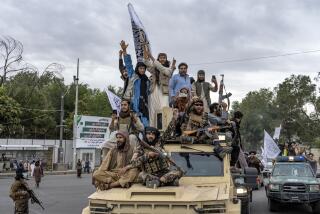Taliban announces spring offensive
- Share via
KABUL, Afghanistan — At a pivotal moment when U.S. forces are winding down combat operations in Afghanistan and handing over the lead security role to the Afghan government, Taliban insurgents announced Saturday the launch of their annual spring offensive.
In an elaborately worded statement, the Taliban proclaimed that a “monumental spring operation” would begin Sunday with the goal of “defeating this era’s Western invaders.” The Islamist insurgent group, tossed from power by U.S.-led forces in late 2001, is threatening a new round of mass suicide bombings and “insider” attacks on American and coalition forces.
After announcing a similar major warm-weather offensive last year, the Taliban launched an attack in Kabul featuring suicide bombings and a deadly 18-hour street battle that targeted the U.S. Embassy and the headquarters of NATO’s international force.
The threat of more insider killings comes after the rate of such attacks slowed in recent months, following upgrades in security procedures by U.S. and Afghan government forces. Afghan soldiers and police — and Taliban infiltrators posing as security force members — killed 62 foreign troops last year and four so far this year, according to coalition figures.
The International Security Assistance Force, the NATO-led coalition that includes about 66,000 U.S. troops, responded Saturday with its own statement dismissing the Taliban challenge.
“The Afghan people should not fear Taliban threats,” the statement said. “The Afghan National Security Forces have wisely used the winter months to prepare for taking over the security lead throughout Afghanistan by mid-2013. They are ready.”
Also Saturday, ISAF announced that a military plane had crashed in southern Afghanistan, killing four ISAF service members. The coalition said the cause of the crash was under investigation but initial reporting indicated no insurgent activity in the area. ISAF did not specify the nationality of those killed, leaving it to member nations to identify casualties pending notification of next of kin.
A Western official in Kabul, the capital, said in response to the Taliban statement that Afghan defense forces are capable of blunting any insurgent offensive.
“This will be the first fighting season where the Afghans will come into the lead. ... It’s an important milestone,”’ the official said.
The Taliban frequently issues florid — and often false — statements boasting of accomplishments or threatening attacks on coalition forces, Westerners or Afghans who support the foreign troops or the Afghan government.
The insurgents typically return to sanctuaries in Afghanistan and neighboring Pakistan in winter, emerging to launch attacks when the weather warms.
Saturday’s statement, issued by the Leadership Council of the Islamic Emirate, said operations would feature unspecified “special military tactics” and “collective martyrdom operations” — a reference to suicide bomb attacks. The offensive, it said, would focus on “bases of foreign invaders, their diplomatic centers and military air bases” in an attempt to “inflict heavy casualties on the foreign transgressors.”
The operation is named after Khalid bin Waleed, a companion of the prophet Muhammad noted for his military prowess, according to a Taliban statement sent to news organizations. The Taliban said its offensive would coincide with a national holiday in Afghanistan on Sunday that celebrates the overthrow of the Soviet-backed government of Mohammed Najibullah in 1992.
The insurgents’ goal is to drive out international troops and topple the government of President Hamid Karzai, the statement said. The Taliban seeks to install an Islamic caliphate in Afghanistan under Sharia, or Islamic, law.
The Afghan Ministry of Defense said Saturday that its defense forces are leading combat operations in 90% of Afghanistan. “The enemies of the people of Afghanistan are afraid of the progress the Afghan National Army has made,” the ministry said in a statement.
U.S. forces have sharply reduced their direct combat role in recent months, putting Afghan army and police forces in charge of most combat operations and security. The number of U.S. forces here is expected to be cut in half by the end of the year, with combat troops scheduled to leave Afghanistan by the end of next year.
The United States and Afghanistan are negotiating a security agreement to set the number of U.S. forces to remain in Afghanistan after 2014, if any.
The negotiations have hinged on the issue of legal jurisdiction for U.S. troops. The Karzai government has sought to hold U.S. forces accountable to Afghan law, while Washington insists that they fall under American legal jurisdiction. The same issue torpedoed similar security talks between the U.S. and Iraq in 2011.
More to Read
Sign up for Essential California
The most important California stories and recommendations in your inbox every morning.
You may occasionally receive promotional content from the Los Angeles Times.











